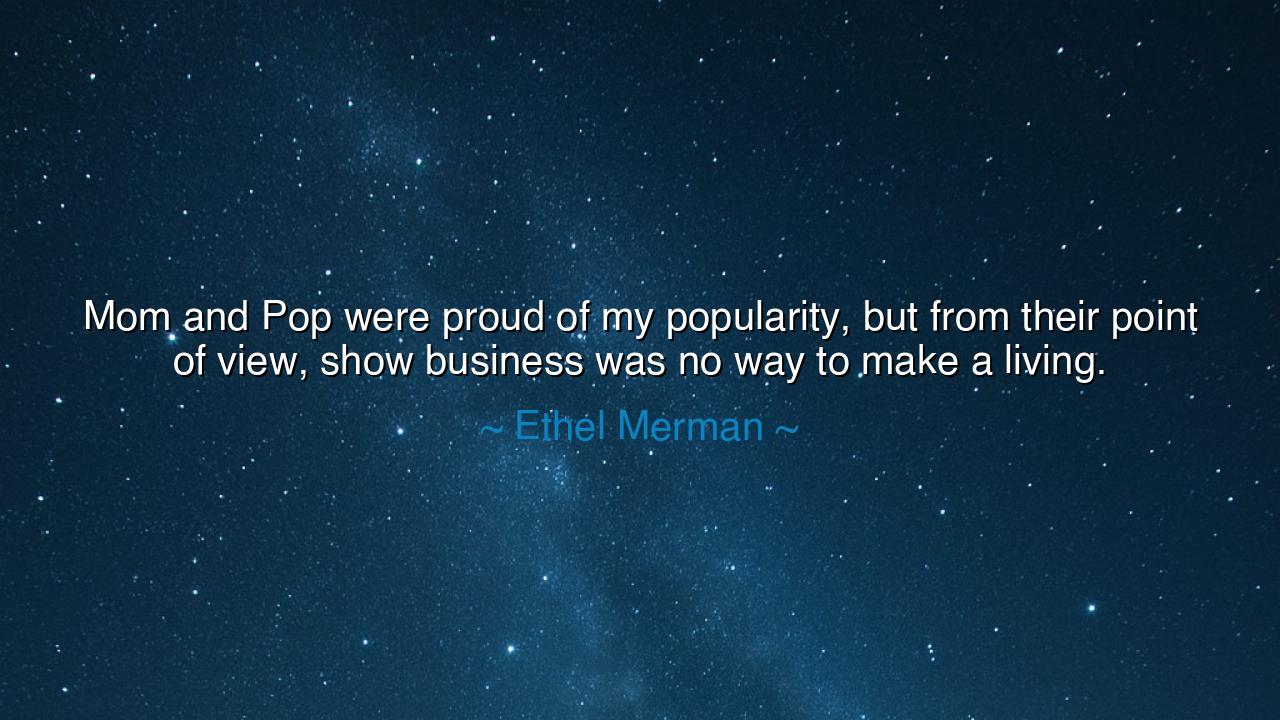
Mom and Pop were proud of my popularity, but from their point of
Mom and Pop were proud of my popularity, but from their point of view, show business was no way to make a living.






Hearken, O seekers of wisdom, and listen to the words of Ethel Merman, whose voice echoed across the stages of the world, yet whose heart remained rooted in the insight of her parents. “Mom and Pop were proud of my popularity, but from their point of view, show business was no way to make a living.” In this reflection lies an eternal tension, a truth as old as the human struggle between aspiration and prudence: the heart’s desire to shine and the elders’ longing for stability, security, and measured reason.
Merman’s words reveal the dual nature of parental love. Pride and worry are intertwined in the hearts of those who have nurtured us. While they rejoiced in her rising fame and celebrated her talents, they could not abandon the caution born of experience. To them, the world of show business was a precarious path, fraught with uncertainty, disappointment, and fleeting fortune. Their wisdom, tempered by life’s hardships, warned that popularity alone is not a guarantee of sustenance or survival.
Consider the tale of Diana Ross, whose extraordinary talent carried her from the streets of Detroit to global acclaim. Though her family celebrated her gifts, they too harbored doubts about the reliability of fame and fortune, knowing that applause and admiration could be ephemeral. In their caution, they mirrored the ancient understanding that success must be balanced with prudence, and that the guidance of those who have weathered life’s storms is a compass for the young and ambitious.
The wisdom in Merman’s reflection is timeless: talent and recognition, though luminous, do not replace the need for grounding, preparation, and foresight. The parents’ view, far from inhibiting ambition, offered a framework of reality within which Merman’s extraordinary gifts could flourish responsibly. Their caution was not opposition, but a profound care—a reminder that human aspiration must be tempered with vigilance.
Throughout history, we see this principle enacted in countless lives. Wolfgang Amadeus Mozart, whose genius dazzled Europe, was guided, admonished, and safeguarded by his father Leopold. While the elder celebrated Mozart’s brilliance, he also knew the precariousness of patronage and fame, urging discipline, study, and humility. Just as Merman’s parents understood the volatility of show business, Leopold recognized the fragile balance between artistic brilliance and worldly sustenance.
From this reflection emerges a lesson for all who hear it: recognize the value of both courage and caution, ambition and grounding. Let your heart pursue greatness, but heed the wisdom of those who have traversed life’s uncertainties. Popularity, wealth, or acclaim, though desirable, cannot replace experience, foresight, and prudence. True success is measured not only by recognition, but by the enduring stability and wisdom that sustain it.
Practical guidance flows naturally from Merman’s insight. Cherish the encouragement of those who celebrate your gifts, but listen closely to their cautions. Seek mentors, elders, and guides who balance admiration with realism. In your own pursuits, combine the boldness of ambition with the grounding of wisdom, ensuring that your talents flourish within a framework that can endure the unpredictable currents of life.
Thus, let the words of Ethel Merman echo through the generations: the applause of the crowd may shine brightly, but the guidance of parents and the lessons of experience illuminate a path that is enduring. Ambition and prudence, brilliance and grounding, joy and caution—these are the twin pillars of a life both luminous and sustainable, and in their union lies the wisdom to navigate the world with both courage and clarity.






AAdministratorAdministrator
Welcome, honored guests. Please leave a comment, we will respond soon